
The innovative program emphasizes clinical applications to meet the evolving needs of health care professionals
The University of New England has announced a new master’s degree program in clinical anatomy intended to bolster medical education and facilitate enhanced research in the biomedical sphere.
The Master of Science (M.S.) in Clinical Anatomy degree program, taught within the UNE College of Osteopathic Medicine (UNE COM), incorporates existing medical curriculum as well as newly developed learning experiences to prepare students for rewarding careers in research or medical education. As students of UNE COM — Maine’s only medical school and New England’s only osteopathic medical school — those enrolled in the Clinical Anatomy program will work alongside their peers in the Doctor of Osteopathic Medicine program, guided by skilled medical school faculty.
The University is also offering a one-year post-baccalaureate certificate in clinical anatomy, intended to prepare students for admission into graduate medical or health degree programs and reinforce understanding of biomedical topics.
The innovative master’s program is designed to provide students with a deep understanding of human anatomy, emphasizing clinical applications to meet the evolving needs of health care professionals.
Learn more about UNE’s new Master of Science in Clinical Anatomy degree program.
The 24-month degree also addresses a growing lack of medical school educators as the nation faces a dearth of physicians and nurses. According to the American Hospital Association, the United States will face a shortage of up to 124,000 physicians by 2033, including shortages of primary care physicians and specialists.
“The biomedical science workforce pipeline, including anatomy, is not adequate to meet the current need for faculty nationwide,” remarked Frank Daly, Ph.D., director of Anatomical Donation in UNE COM’s Department of Biomedical Sciences. “It will only get worse in the coming years.”
Daly noted that experts predict a need for at least 40 to 51 master's- and professional-level anatomy graduates each year to meet current demand.
Students in the Clinical Anatomy master’s degree program will benefit from the excellence of a UNE COM education. UNE COM is consistently ranked as a top medical school in the fields of primary care and graduates practicing in underserved areas and for students matching to their first-choice residency program.
At the heart of the Clinical Anatomy program is UNE’s human body donor anatomy lab, a state-of-the-art facility that is the only lab of its kind in southern Maine.
Students will immerse themselves in the lab through hands-on dissection and analysis made possible by generous human body donors across five pods fitted with cutting-edge equipment. Under the guidance of faculty, students will prepare and demonstrate dissections, assist medical and dental students, and create and deliver educational instruction — a curriculum that is truly singular to the region.
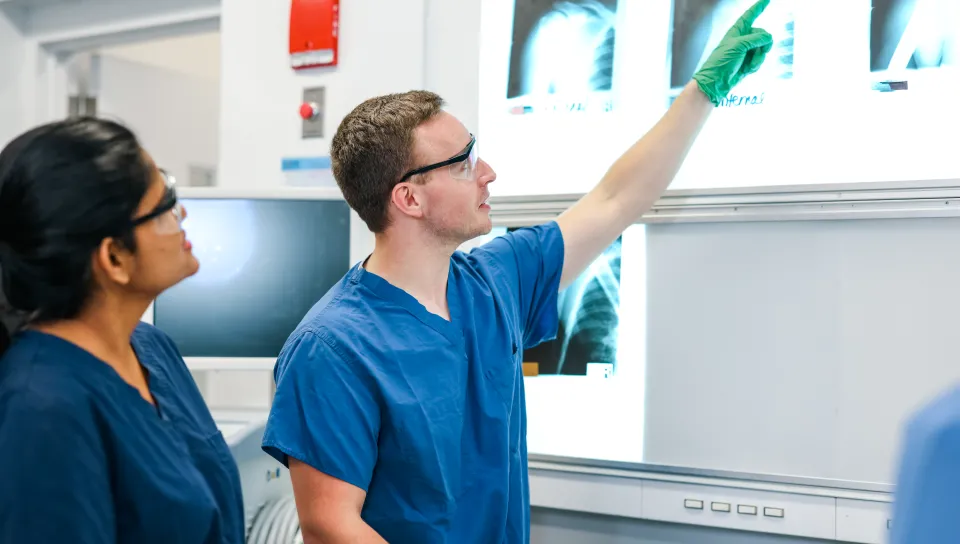
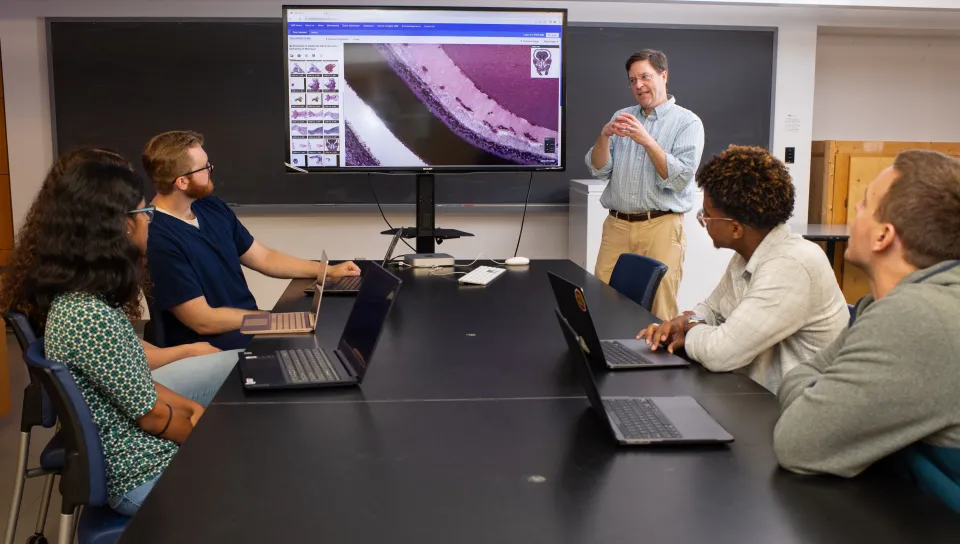
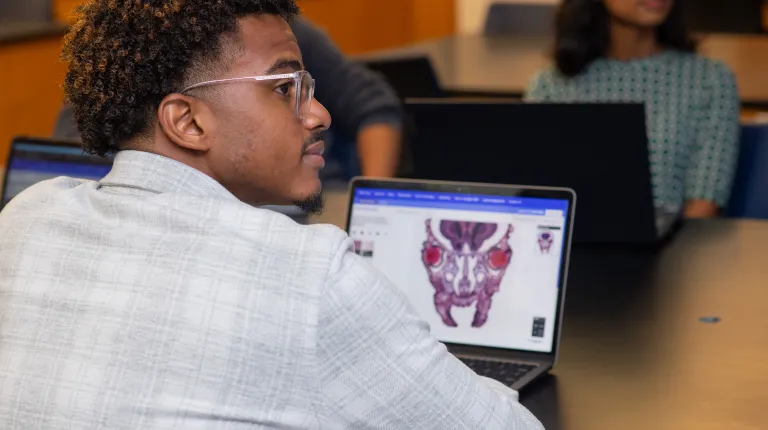
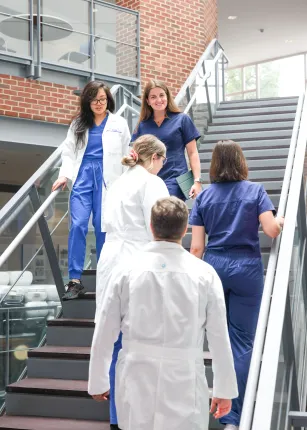
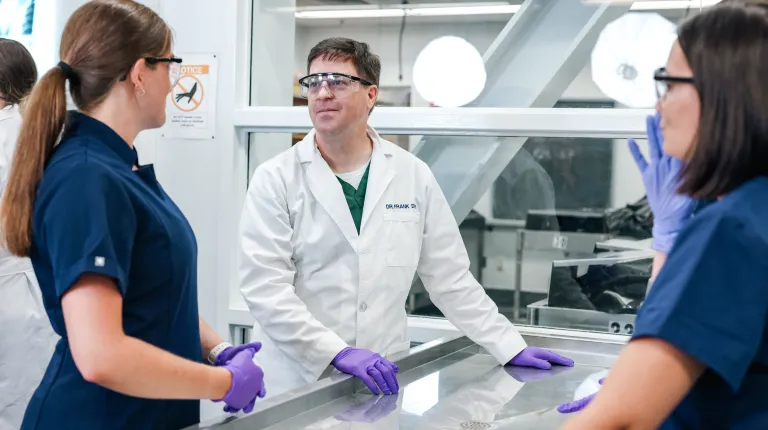
Students on the research track will have the opportunity to participate in biomedical research within a team of UNE faculty, postdoctoral researchers, and students, solving real-world problems at an institution that leads the state in federal health research funding among colleges and universities. Students on the educational track will gain teaching skills and knowledge from current anatomy faculty and define the future of medical education.
Students in both tracks, along with those enrolled in the certificate program, will gain from a comprehensive health sciences university that is nationally recognized for excellence in preparing students for collaborative, interprofessional, team-based care.
UNE’s plan to relocate the College of Osteopathic Medicine to Portland, a key component of the University’s “Doing Our Part” comprehensive campaign, will bring together nearly all of the University’s health professions programs onto a single, interprofessional campus, an unprecedented model in New England. As such, those in the UNE Clinical Anatomy program will collaborate directly with students in Maine's only dental school and physician assistant degree program, along with those in the other allied health professions, on the newly renamed Portland Campus for the Health Sciences.
“These new programs address strategic initiatives for the College of Osteopathic Medicine, the University, and national associations who are working together to ensure that our country will have the health infrastructure needed to support future generations,” Daly said.
About the University of New England
The University of New England is Maine’s largest private university, with two beautiful coastal campuses in Maine, a one-of-a-kind study abroad campus in Tangier, Morocco, and an array of flexible, accredited online degrees. In an uncommonly welcoming and supportive community, we offer hands-on learning, empowering students to make a positive impact in a world full of challenges. The state’s top provider of health professionals, we are home to Maine’s only medical college, Maine’s only dental college, a variety of other interprofessionally aligned health care degree programs, as well as nationally recognized programs for marine science degrees, natural and social sciences degrees, arts and humanities degrees, and business degrees.